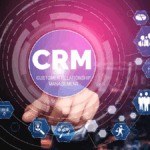In 2025, customer experience is more than just a buzzword—it’s a competitive advantage. Whether you’re a startup or an enterprise, having the right CRM (Customer Relationship Management) tool can make or break your ability to attract, retain, and delight customers. With so many options on the market, choosing the best CRM can feel overwhelming. To simplify your search, here are the top 10 CRM tools to grow your business in 2025.
1. HubSpot CRM
Best for: Startups & small businesses
Why It Stands Out:
HubSpot offers a powerful free tier and an all-in-one solution for sales, marketing, and customer service. It’s intuitive, scalable, and perfect for growing companies.
Key Features:
- Free forever plan
- Email tracking & marketing tools
- Pipeline management
- Seamless integrations
2. Salesforce
Best for: Mid to large enterprises
Why It Stands Out:
Salesforce is a leader in the CRM space, offering robust, customizable solutions tailored to virtually any business size or industry.
Key Features:
- Advanced analytics & AI tools
- Custom workflows
- App marketplace (AppExchange)
- Cloud-based flexibility
3. Zoho CRM
Best for: Cost-effective growth
Why It Stands Out:
Zoho CRM is affordable and packed with features, from multichannel marketing to automation and analytics.
Key Features:
- Omnichannel communication
- AI-powered sales assistant
- Workflow automation
- Great mobile app
4. Pipedrive
Best for: Sales-focused teams
Why It Stands Out:
Pipedrive is simple and visual, making it easy for sales teams to manage leads and close deals faster.
Key Features:
- Visual sales pipeline
- Activity reminders
- Customizable reports
- Email sync
5. Freshsales by Freshworks
Best for: End-to-end sales automation
Why It Stands Out:
Freshsales offers a clean UI, built-in telephony, and a unified platform for sales and marketing.
Key Features:
- AI-based lead scoring
- Email campaigns
- Sales automation
- Easy CRM-migration tools
6. Insightly
Best for: Project-based businesses
Why It Stands Out:
Insightly combines CRM with project management, making it ideal for service-based teams.
Key Features:
- Project and task tracking
- Workflow automation
- Email templates
- Integrates with G Suite & Office 365
7. Nimble
Best for: Social CRM and solopreneurs
Why It Stands Out:
Nimble integrates social media insights into CRM, giving you richer customer profiles and better engagement.
Key Features:
- Social media integration
- Smart contact management
- Relationship tracking
- Unified inbox
8. Copper CRM
Best for: Google Workspace users
Why It Stands Out:
Built specifically for Google Workspace, Copper integrates seamlessly with Gmail, Docs, and Calendar.
Key Features:
- Native Gmail interface
- Zero data entry
- Automated workflows
- Easy setup
9. Keap (formerly Infusionsoft)
Best for: Automation-heavy marketing & sales
Why It Stands Out:
Keap combines CRM with marketing automation, e-commerce tools, and payments—ideal for solopreneurs and small businesses.
Key Features:
- Email marketing
- Appointment scheduling
- Payment tracking
- Pre-built automation
10. Monday Sales CRM
Best for: Custom workflow management
Why It Stands Out:
From the makers of Monday.com, this CRM offers high flexibility and a colorful, visual dashboard that’s easy to customize.
Key Features:
- Drag-and-drop UI
- Custom sales pipelines
- Integrations with Slack, Outlook, and more
- Activity tracking
Final Thoughts
In 2025, CRM software isn’t just a sales tool—it’s your business growth engine. Whether you’re looking for simplicity, automation, or integration with existing tools, there’s a CRM here to fit your needs. The right choice will help you close more deals, build better relationships, and scale faster.
Pro Tip: Start with a free trial to test out features before you commit.
Would you like a comparison table or full-length article (1000–2000 words) on these tools? I can help you expand this guide further.











